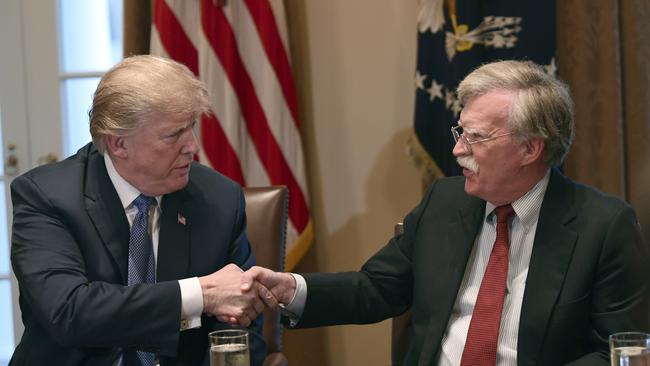Trump bowed to Pentagon restraint
Donald Trump was dissuaded from more robust action, in the irst test of new national-security team.

Donald Trump deferred to his Pentagon chief’s caution and tempered his preference for a more robust attack on Syria over allegations it used deadly gas on civilians, revealing the first hints at the direction of his revamped national-security team.
The decision, detailed by people familiar with the process, marked the first test of the group now that John Bolton is serving as national security adviser.
After days of tense White House meetings, the President and his advisers agreed on one of the most restrained of the options crafted by the Pentagon: a powerful missile attack aimed at three targets meant to hobble the Syrian regime’s ability to use chemical weapons and deter Bashar al-Assad from using them again.
The outcome was a sign of the sizeable influence Defence Secretary Jim Mattis still wields in the reorganised national-security team. Faced with a push from the President for a muscular response to the gas attack on Douma, Mr Mattis presented the White House with three military options.
The most conservative option would have hit a narrow set of targets related to Syria’s chemical-weapons capabilities.
The second option proposed strikes on a broader set of Syrian regime targets, including suspected chemical-weapons research facilities and military command centres.
The most expansive proposal, which might have included strikes on Russian air defences in Syria, was designed to cripple the regime’s military capabilities without touching Assad’s political machinery.
The most ambitious of the proposals was three times the size of the one eventually carried out by US, British and French forces.
Mr Trump approved a hybrid plan that saw 105 advanced missiles fired at the three Syrian targets. That action reflected a melding of the first two options: modest missile strikes, but ones the Trump administration said delivered a decisive blow to Assad’s chemical-weapons capabilities.
While Mr Trump pressed his team to also consider strikes on Russian and Iranian targets in Syria if necessary to get at the Assad regime’s military equipment, Mr Mattis pushed back, those familiar with the decision-making said.
UN ambassador Nikki Haley had joined Mr Trump in calling for more forceful response, while Mr Mattis warned about the risk of a more expansive strike triggering a dangerous response from Moscow and Tehran.
Mr Bolton worked to forge a difficult compromise. Conscious of his public image as someone quick to favour military action, he pressed for a “ruinous” strike that would deliver a concrete blow to some part of Assad’s regime, but not for the most aggressive options.
Mr Bolton knew the respect Mr Trump had for Mr Mattis and may have thought it wise to defer initially to the Pentagon chief. When the two met at the Pentagon a few weeks ago, Mr Mattis jokingly told Mr Bolton he had heard he was “the devil incarnate,” a reputation the new national security chief understood followed him into the West Wing.
Mr Bolton also realised the most robust option might drag the US more deeply into the conflict and force him to take responsibility for a greater US role in the civil war. He felt that was too much for his first week on the job.
The Wall Street Journal


